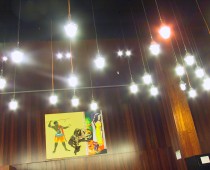Freakonomics on good ideas
Luck
Motion
Prepared mind
Distinctive action
Margaret Geller – feeling free. So an idea can come
- structured the shortcut approach to a view
- Used a new tech
- Had a new map of the cosmos
George Dyson – tried 5,127 times to improve the vacuum
- Saw something badly designed
- Saw a factory that had a good process for sucking out dust
- 5 years of tinkering and he got the vacuum
Christophe Nieman – combinatorial formula for freshness
- Prompted with a topic like a headline
- X suggests these symbols
- Y suggests these symbols
- Spin them together
- Consider complications of X and Y as symbols
- Try to combine them and another new direction is revealed
The cue –
- Intrinsic motivation. Making for yourself. More creative. (Advertising people say their greater passion is for their art school passions, which advance more slowly though)
- Extrinsic motivation. Making for a requirement. Less creative. But constraints help you ship.
Michael Beirut – pentagram designer, an extrinsic motivation from clients.
- Chuck Close: “Inspiration is for amateurs. The rest of us just show up and get to work.”
- Work and be ready so when the assignment comes you can invent the solution.
Ann Pasternak – Ex-CreativeTime, Brooklyn Museum
- giving a commission:
Charlotte Niemuth – HBS Prof on designing a creative team
- Size is 5. Not more than 7
- Start by discussion in group of problem
- Then separate individual proposal development
- Then bring back together
- Team emergent phenomena
- Brainstorming: the key to brainstorming is shutting down dissent said originator Osborne; permitting criticism/debate caused better more creative sessions in experiments or in juries. Less debate = less quality of investigation. Even when the dissenter is wrong; it’s important because it challenges your thinking.
- Eg Troublemakers help
Ai Wei Wei – troublemaking
- his family style
- Had little to say on where his ideas come from
Jorinde Voigt – Berlin artist
- subconscious
Maira Kalman
- what you feel in your gut
- my own feelings, subconscious
Conan O’Brien
- responding to a good idea, improvisation
- Travel
Roseanne Cash
- Museums
Jennifer Egan –
- responding to other work
- Non-repetition
- People watching at baseball games
Saul Perlmutter – find mind-boggling stuff. Being boggled.
